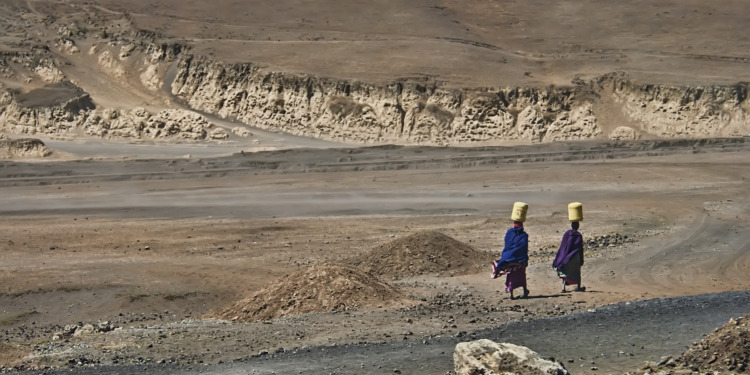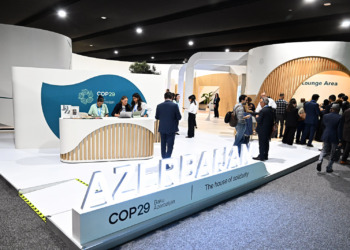ICLEI, the global network of more than 2,500 local and regional governments, and the World Resource Institute announced Monday that they would launch the African Cities Water Adaptation Fund (ACWA Fund) for water resilience efforts in Africa. The announcement came at the COP27 Conference currently being held in Sharm El-Sheikh, Egypt throughout the end of the week and was launched with the support of multiple funding partners.
#ICLEI is thrilled to be here, launching the #ACWAFund as core partner at #COP27 with @WorldResources & others. As a program enabler organization, we consistently work to ensure that funding is localized and channeled to where it is needed mosthttps://t.co/GTiLwzcl0U pic.twitter.com/sn0TFHoQzf
— ICLEI (@ICLEI) November 14, 2022
“African cities need to be at the forefront of our financing priorities,” said Wanjira Mathai, Managing Director for Africa and Global Partnerships at WRI. “Our goal with the ACWA Fund and Platform is to ensure city leaders have a go-to facility that is responsive to their needs.”
ACWA Fund: What’s to come?
The ACWA Fund is expected to provide $5 billion toward urban water resilience in 100 African Cities by 2032. The fund will allow city leaders to directly access funding and technical support to implement water solutions, which include but are not limited to integrated governance, watershed management, improved stormwater management, more sanitation services, etc.
The fund is supported by 23 institutions, making up the ACWA Platform, which will provide the necessary assistance and support when it comes to financing and implementation.
The ACWA Platform consists of a coalition of experts and researchers that will support project development and planning. City stakeholders will work alongside experts to establish investment-ready projects.
Thrilled to join the launch of the #ACWA fund today at #COP27. Cities in Africa face escalating water-related challenges.
Together, this growing coalition of over 20 partners will aim to channel $5 billion towards urban water resilience solutions in 100 African cities by 2032. pic.twitter.com/kjU1fnlnub
— Ani Dasgupta (@AniDasguptaWRI) November 14, 2022
However, with big aims come big costs and the ACWA won’t be short of requirements. The ACWA fund will need some $600 billion for infrastructure investment and $9-14 billion to regularly secure water resources.
In order to acquire the necessary financing, the ACWA fund will receive funding through grants and congressional loans. Initially, the fund is expected to get $222 million in grants, $288 in direct investment and $5 billion in additional investments.
If successful, the coalition’s goal is to improve water access for roughly 29 million people, conserve 137 cubic meters of water and employ 64,000 people.
“The economic case for investments in water security is robust – and with climate change and other drivers exacerbating pressure on water systems, the value of investments in resilience is further heightened,” said Mayor Pudence Rubingisa of Kigali, Rwanda. “The City of Kigali is thrilled to be collaborating with the ACWA Fund to deliver resilient water services that ensure for our city an equitable and prosperous future. As we work to tackle our water challenges, we are also looking forward to joining the ACWA Platform as one of its first partner cities and gaining access to the Platform’s pool of experts.”
#COP27 :The Mayor @PudenceR attended the launch of the African Cities Water Adaptation Platform #ACWA and the announcement of African Cities Water Adaptation Fund #ACWAFund pic.twitter.com/LJdPSuZFIY
— City of Kigali (@CityofKigali) November 14, 2022
Water security in Africa
By 2025, close to 230 million Africans are predicted to be faced with water scarcity, with an additional 460 million who will live in water-stressed areas according to Global Citizen, an international education and advocacy organization.
Africa is dealing with both economic scarcity and physical scarcity of resources.
Economic water scarcity refers to the lack of infrastructure able to provide citizens with adequate water. Physical scarcity is a result of climate-change-induced events like droughts which have led to the lack of water.
At the moment, Africa is in the midst of one of its worst droughts after four failed consecutive rainy seasons. The 2022 March-May rainy season was their driest season on record during which Africa saw sharp increases in food, water and nutrition insecurity and a high death toll of livestock.
In Kenya, 1.5 million livestock have died this year and in Ethiopia 2.1 million — a total of 3.6 million livestock dying this year because of drought conditions. In Somalia, the situation is worse with 1 out of 3 livestock having perished since mid-2021.
1 in 3 African citizens are impacted by water scarcity in some form, according to Global Citizen who adds water scarcity has also led to violence.
Communities alongside Lake Chad have erupted in violence as citizens battle for limited water resources. The disputes mainly lie in the agricultural sector between fishers and farmers, however, these arguments have led to the injury and deaths of a plethora of innocent citizens searching for water.
Down to Earth reports in 2021, 90% of Lake Chad had shrunk and as a result of the Lake Chad basin crisis, Chad is among the 10 least peaceful countries in Africa.
The agricultural sector has also taken a big blow from the lack of available water resources, with crop instability and food insecurity becoming more prevalent over the years. The blow has not hit lightly as agriculture is one of the continent’s main sources of income.
The latest ACWA Fund hopes to address the multitude of issues water scarcity has caused throughout the continent.
However, WRI notes funds for water infrastructure improvement in the past have failed to reach Africa before. According to WRI, of the $100 billion provided to improve water infrastructure in Africa since 1990, sub-Saharan Africa received less than 1%.
As the COP27 Conference comes to a close this week, all eyes are on the WRI’s latest project to effectively assist in helping a continent at the forefront of the water crisis — one that is quite literally teetering on the edge, waiting for the rain, and hopefully, the rainbow afterward.
Editor’s Note: The opinions expressed here by the authors are their own, not those of Impakter.com — In the Featured Photo: Villagers from Tanzania travel long distances to find water on July 19, 2011. Featured Photo Credit: Anita Ritenour.










